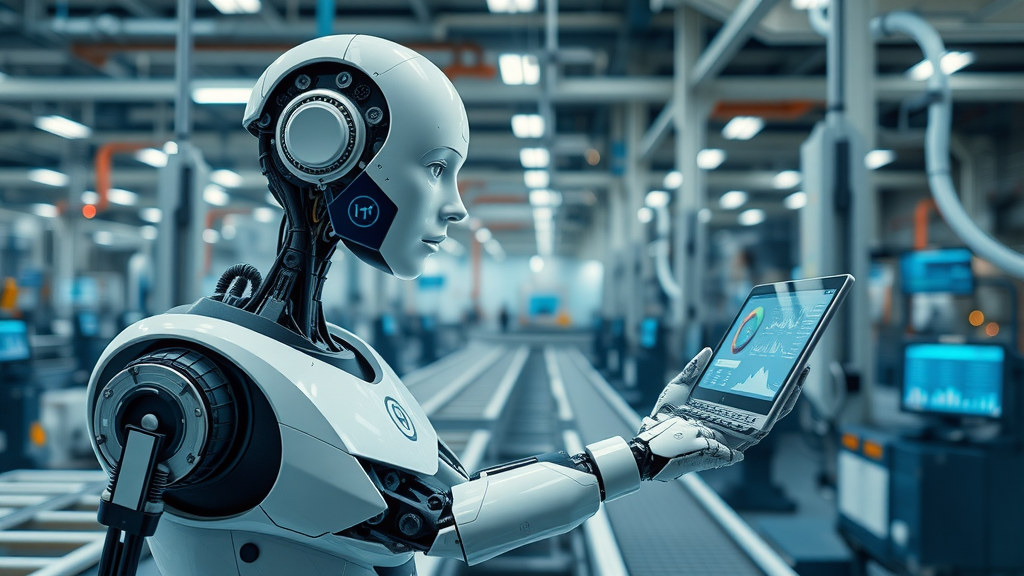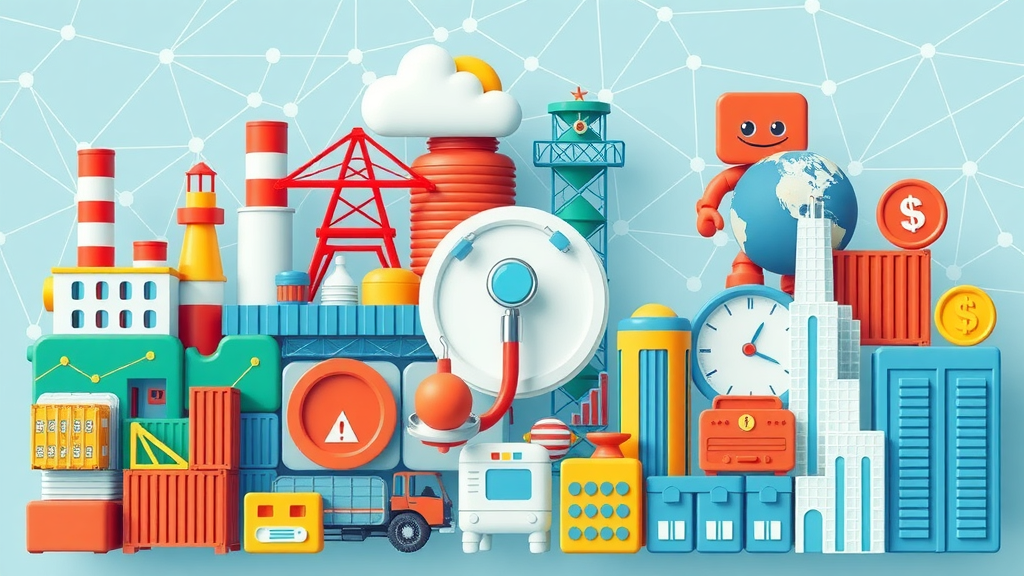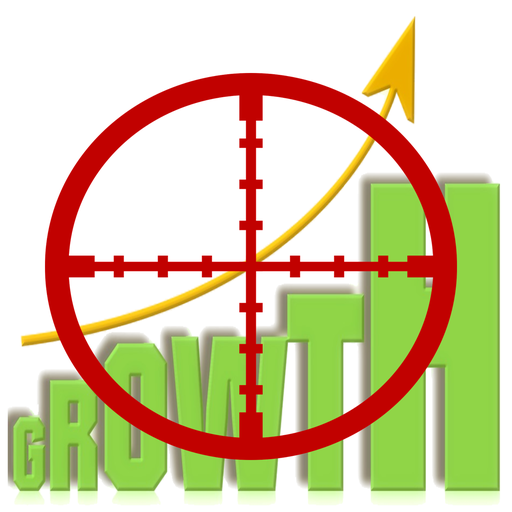Did you know that by 2030, artificial intelligence is expected to inject $15.7 trillion into the global economy? From reshaping production lines to revolutionizing how industries analyze data, AI in industry sectors is creating unprecedented opportunities for businesses ready to adapt. This guide uncovers how leveraging AI can rapidly accelerate your organization's growth, offering you practical insights, success stories, and proven strategies to stay ahead. Whether you’re an executive, entrepreneur, or technology enthusiast, now is the time to unlock the potential of artificial intelligence within your industry.
Startling Facts About AI in Industry Sectors
The advancement of artificial intelligence across various sectors is more than a technological trend—it's an economic and business revolution. Its integration isn’t limited to just tech giants or innovative startups. In fact, even traditional sectors like oil and gas, supply chain, healthcare, finance, and real estate are transforming rapidly through AI adoption. According to PwC, industries implementing AI have already seen measurable workforce productivity increases, lower operational costs, and better decision-making through data analytics. Across manufacturing, AI solutions streamline operations, while in finance and healthcare, they're critical for predictive analytics and diagnostics. Every sector is discovering that the key to future growth lies in embracing data-driven strategies and advanced digital technologies.
"By 2030, artificial intelligence is anticipated to contribute $15.7 trillion to the global economy. – PwC"

What You'll Learn in This Guide to AI in Industry Sectors
Core concepts of artificial intelligence (AI) and machine learning (ML)
Key verticals driving AI adoption in business and industry
How ai solutions, ai agent, and generative ai influence sectoral growth
Success stories and emerging trends in real-world industry sectors
Understanding Artificial Intelligence in Industry Sectors
Defining Artificial Intelligence, Machine Learning, and Data Science
At its core, artificial intelligence refers to computer systems that simulate human intelligence processes, enabling machines to sense, reason, learn, and act autonomously. Machine learning is a subset of AI, focused on designing algorithms that allow systems to learn from data and improve over time without explicit programming. Paired with data science, industries tap into meaningful insights derived from big data and data analysis—empowering smarter business decisions. In industry sectors, these AI concepts drive automation, optimize processes, and deliver predictive analytics across manufacturing, oil and gas, healthcare, and beyond. By integrating learning algorithms and advanced analytics, AI helps organizations harness the power of specific data sets and actively solve complex operational challenges.

Key Drivers for AI Adoption in Industry Sectors
Why are industries prioritizing AI adoption? First, the sheer volume and velocity of data—from sensor networks to transactional records—demand ai tools for meaningful extraction and use. Strong operational efficiency pressures, rising global competition, and the need for reliable data analytics push business leaders to integrate AI into their core functions. Additionally, as customer experience grows more central, AI agents enable enterprises to deliver personalized, scalable customer service. The uptick in automation reduces costs, enhances precision in production processes, and allows organizations to respond nimbly to changing market trends. Ultimately, the adoption of artificial intelligence is a necessity for any forward-thinking business leader—not just for technological advancement, but for strategic survival.
"AI adoption is not an option, but a necessity for forward-thinking business leaders."
AI Adoption Across Major Industry Sectors
AI in Manufacturing: Automation and Data Analytics
Manufacturing is undergoing a renaissance thanks to ai in industry sectors. Automated robotics, enabled by advanced machine learning algorithms, inspect products, predict maintenance needs, and optimize workflows based on real-time data analytics. Predictive analytics and computer vision transform quality assurance, catching anomalies faster than any manual inspection process. By leveraging ai solutions, manufacturers experience decreased downtime and increased productivity, leading to significant cost savings and improved production output. Low AI adoption is no longer an option—as competitors embrace smart factories and intelligent workflows, lagging behind means losing market share. With ai agent systems monitoring every phase of production, businesses not only achieve operational efficiency but can flexibly adapt to evolving global demands.
AI in Oil and Gas: Optimizing Exploration and Efficiency
In the oil and gas sector, AI bridges the gap between legacy infrastructure and cutting-edge efficiency. Machine learning models analyze seismic data and geology to predict optimal drilling locations, reducing exploration costs and environmental risks. AI-driven predictive maintenance averts equipment failures, while intelligent sensors monitor pipelines for leaks and threats in real time. Data science is pivotal here, aggregating complex, multi-source data to drive actionable insights for field engineers. Moreover, AI agent systems enable safer remote operations, while generative AI helps design new extraction techniques. The cumulative effect is a transformation from reactive to proactive asset management, making AI adoption indispensable for optimizing exploration and sustaining profitability in this volatile sector.
AI in Supply Chain: Smarter Logistics and Inventory Management
Effective supply chain management is all about the right goods, at the right place, at the right time. AI solutions now power critical aspects of logistics, from route optimization with real-time traffic data to AI-driven demand forecasting using advanced machine learning. Businesses adopting AI in supply chain operations realize lower inventory costs, fewer stockouts, and seamless coordination across multi-node networks. Integrated AI tools conduct granular data analysis to identify bottlenecks, while AI agents proactively manage supplier relationships and automate procurement tasks. By harnessing predictive analytics, companies are better equipped to respond to disruptions—whether due to global events or shifting consumer preferences—thus ensuring operational continuity and enhanced customer service.

AI in Healthcare: Enhancing Diagnostics with Machine Learning
The healthcare sector stands at the forefront of digital transformation, thanks in large part to artificial intelligence and machine learning. AI-powered diagnostic tools are enhancing medical image interpretation, enabling earlier and more accurate detection of diseases such as cancer and cardiovascular conditions. Predictive analytics identifies patient risk factors, while AI algorithms personalize treatment recommendations based on a patient’s genetic profile and medical history. Telemedicine applications, powered by AI agents, improve access to healthcare professionals and facilitate more personalized patient engagement. These advances promote operational efficiency, reduce costs, and potentially save lives. As data science continues to evolve, healthcare will unlock new ways to harness big data for both patient-centered and organizational gains.
AI in Finance: Fraud Detection and Predictive Data Analytics
Few sectors benefit from AI in business transformation more than finance. Artificial intelligence helps detect fraudulent transactions by analyzing patterns within massive, continuously updated data sets—often in real time. Advanced machine learning algorithms not only identify unusual activity, but also reduce false positives, streamlining fraud detection for banks and fintech companies. Beyond security, AI empowers predictive analytics to assess credit risk, optimize investment portfolios, and anticipate market fluctuations. Data science is central to this, aggregating signals from specific data sources to aid decision-making. Financial institutions that leverage AI solutions enjoy not just tighter risk management, but also better customer engagement via AI-driven chatbots, personal finance assistants, and seamless digital onboarding.
AI in Real Estate: Intelligent Market Insights
In the competitive world of real estate, AI's ability to analyze complex variables—listing prices, neighborhood trends, buyer behaviors—offers companies and agents a distinct edge. Generative AI tools can predict property values, tailor marketing strategies, and identify ideal investment properties. AI solutions in property management automate lease renewals, schedule maintenance, and optimize tenant acquisition through AI agents. Data analytics tools enable real-time market analysis, empowering professionals to react swiftly to shifts in demand or pricing. As AI adoption deepens, the real estate sector is poised to benefit from smarter deal-making, resource allocation, and risk management, leading to better outcomes for businesses and their clients.
Key AI Solutions Transforming Industry Sectors
Generative AI and Its Impact on Product Design and Research
Generative AI is rapidly changing the landscape of product design and research across all industry sectors. Leveraging machine learning and data science, generative AI tools can create new product prototypes, simulate real-world scenarios for testing, and expedite research cycles once limited by manual trial and error. Manufacturers use generative AI to design more efficient engine components, while pharmaceutical companies rely on these models to predict potential new drugs. The scalability of generative AI allows businesses to reduce costs, accelerate innovation, and introduce products to the market faster. In an environment where agility and creativity are increasingly vital, generative AI offers a sustainable competitive advantage to organizations willing to adopt AI-driven strategies.
AI Agents for Customer Service and Engagement
AI agents have revolutionized customer service by offering 24/7 support, personalized interactions, and instant resolution for common queries. Across industries—from banking to retail—AI-powered chatbots handle thousands of customer interactions per minute, drawing on sophisticated machine learning algorithms that learn and adapt with every conversation. These AI solutions free human agents for complex tasks, enhancing both customer satisfaction and operational efficiency. Furthermore, integrated AI agents gather data on customer behavior, providing actionable insights for sales and marketing. Low AI adoption in customer service is quickly becoming a disadvantage as businesses discover that AI agents improve retention, cross-sell opportunities, and the overall customer experience.
Integrating AI Solutions with Traditional Data Analytics
A successful AI transformation hinges on integrating ai solutions with established data analytics frameworks. Data science remains at the heart of this integration, enabling organizations to move from descriptive analytics (“what happened”) to predictive and prescriptive analytics (“what will happen and what should be done”). This fusion not only enhances operational workflows but also ensures that AI models are constantly refined using new and relevant specific data. Business leaders who adopt AI alongside traditional analytics gain a holistic view of their organization’s potential, opening doors to continuous optimization and sustainable growth. By bridging innovative AI capabilities and time-tested analytics, companies unlock higher efficiency, actionable business intelligence, and improved decision-making.
Navigating Challenges: Barriers to AI Adoption in Industry Sectors
Common Roadblocks for AI Adoption
Despite the tremendous potential of AI in industry sectors, several roadblocks can hinder widespread implementation. Organizations often struggle to access clean, comprehensive data—an essential input for machine learning and effective data science. Legacy systems can limit integration, requiring significant investment in IT infrastructure upgrades. Skills gaps are another significant hurdle, as many companies lack employees with expertise in AI solutions or data analytics. Additionally, concerns about data privacy, ethics, and regulatory compliance complicate adoption, particularly in highly regulated industries such as healthcare and finance. For some, fear of job displacement or cultural resistance within the business environment can also limit enthusiasm for AI transformation, slowing progress even when the business case is clear.

Strategic Approaches to Overcome Implementation Gaps
To overcome gaps in AI adoption, companies must take a holistic, strategic approach. This begins with business leaders aligning AI initiatives with broader organizational goals, ensuring buy-in from stakeholders at every level. Upskilling teams in data science and machine learning increases employee readiness and confidence. Collaboration with technology partners and investment in robust IT infrastructure smooth the transition toward new AI solutions. A phased implementation approach—starting with pilot programs and scalable use cases—builds momentum and illustrates return on investment. Organizations should also establish clear governance frameworks to address data privacy, ethics, and compliance concerns. With these strategies in place, the barriers to AI integration become surmountable, clearing a path for industry sectors to fully realize the potential of artificial intelligence.
"Investing in data science and employee readiness accelerates successful AI integration."
How Business Leaders Drive AI in Business Transformation
Aligning AI solutions with business goals
Prioritizing data analytics for decision making
Championing organization-wide AI literacy
Business leaders are the catalysts for digital transformation within their sectors. By integrating AI solutions into core business operations, leaders ensure that new technologies directly support financial targets, operational benchmarks, and customer success. Investing in data analytics capabilities enables evidence-based decision-making, while a culture of continuous learning ensures teams can keep pace with evolving AI applications. Championing organization-wide AI literacy is not just about technical training—it’s about fostering an innovation mindset. As industry sectors face intensifying competition, only those led by visionary leaders, prepared to leverage AI for both incremental and breakthrough improvements, will stay ahead of the curve.
Tables: AI in Industry Sectors—A Comparative Overview
Comparison of AI Adoption, Benefits, and Maturity Across Industry Sectors |
||||
Industry Sector |
AI Adoption Level |
Primary AI Applications |
Key Benefits |
AI Maturity |
|---|---|---|---|---|
Manufacturing |
High |
Automation, Predictive Maintenance, Quality Control |
Operational Efficiency, Reduced Downtime, Lower Costs |
Advanced |
Oil and Gas |
Moderate |
Exploration Optimization, Predictive Analytics, Remote Monitoring |
Risk Reduction, Cost Savings, Improved Safety |
Intermediate |
Supply Chain |
High |
Logistics, Forecasting, Route Optimization |
Inventory Management, Faster Delivery, Improved Coordination |
Advanced |
Healthcare |
Rapidly Growing |
Diagnostics, Predictive Analytics, Patient Engagement |
Improved Outcomes, Cost Reduction, Enhanced Patient Experience |
Developing |
Finance |
High |
Fraud Detection, Predictive Analytics, Customer Service AI Agents |
Risk Management, Customer Satisfaction, Higher Revenue |
Advanced |
Real Estate |
Moderate |
Market Analysis, Predictive Pricing, AI Agents for Management |
Smarter Deals, Automated Operations, Enhanced Insights |
Developing |
People Also Ask About AI in Industry Sectors
What industry sector is AI in?
Answer: AI in industry sectors cuts across multiple domains, including manufacturing, oil and gas, supply chain, healthcare, finance, and real estate, integrating advanced artificial intelligence, machine learning, and data analytics for digital transformation.

How is AI used in the industrial sector?
Answer: In the industrial sector, artificial intelligence is leveraged to automate operations, enhance safety, enable predictive maintenance, and extract actionable insights through data science and advanced data analytics.
What are the 7 main areas of AI?
Answer: The 7 main areas of AI include machine learning, natural language processing, robotics, computer vision, expert systems, generative AI, and planning/scheduling—empowering industry sectors globally.
What type of AI is used in industry?
Answer: Industry sectors employ machine learning, AI agents, generative AI, and predictive analytics as the most pervasive types of artificial intelligence in applications ranging from automation to customer service.
Emerging Trends and Future of AI in Industry Sectors
Top Innovations: Generative AI, Autonomous Agents, and Advanced AI Solutions
The future of AI in industry sectors is being shaped by high-impact innovations such as generative AI, autonomous agents, and increasingly advanced AI solutions. Generative AI continues to redefine product design and R&D by autonomously solving creative and engineering challenges. Autonomous AI agents, engineered for decision-making and real-time adaptation, are transforming everything from inventory management to predictive diagnostics. Advanced machine learning and computer vision technologies unlock entirely new business models, while data science ensures these innovations are actionable and scalable. Combined with ever-growing big data sources, these breakthroughs position industries for unprecedented efficiency, agility, and growth—underscoring why staying current with AI adoption is a vital strategy for future-ready organizations.
Most Frequently Asked Questions About AI in Industry Sectors
What are the biggest benefits of AI adoption for industry sectors?
AI adoption streamlines operations, reduces costs, enhances productivity, and unlocks new business opportunities through predictive analytics and automation.How can small businesses leverage AI solutions?
Small businesses can leverage AI by starting with cloud-based AI tools for data analysis, customer service automation, and demand forecasting, enabling cost-effective innovation and competitiveness.What skills are essential for AI implementation in traditional sectors?
Essential skills include data science, machine learning, data analytics, business intelligence, and AI project management—alongside a culture that embraces innovation.Are there risks associated with AI adoption in business?
Yes, risks include data privacy concerns, ethical issues, job displacement, and potential bias in AI algorithms, requiring thoughtful governance and continuous oversight.
Key Takeaways on AI in Industry Sectors
AI adoption is revolutionizing multiple industry sectors through advanced data analytics and automation
Generative AI and machine learning are redefining product and process optimization
Overcoming barriers to AI in industry sectors requires strategic alignment and strong data science capabilities
Conclusion: Unlocking the True Potential of AI in Industry Sectors
AI’s rapid adoption promises extraordinary growth and transformation. The true potential of AI in industry sectors will be realized by leaders and teams who act now, invest in AI solutions, and champion continuous innovation.
Take Action: Integrate AI in Industry Sectors for Seamless Growth
Struggling to make All of your Marketing Strategies Work Together Seamlessly and Effortlessly? Confusion leads to Missteps and Missed Opportunities. Click the Link and Get “The Ultimate Guide to AI-Powered Digital Marketing Strategies"
Sources
Artificial intelligence (AI) is revolutionizing various industry sectors by enhancing efficiency, innovation, and decision-making processes. To deepen your understanding of AI’s transformative impact, consider exploring the following resources:
“AI is becoming ingrained in businesses across industries. Where is it going in 2025?” (apnews.com)
This article discusses how AI is becoming a critical component for businesses across various industries, with companies shifting from proving AI’s value to scaling its use.
“AI-intensive sectors are showing a productivity surge, PwC says” (reuters.com)
This report highlights how the use of AI in business is leading to a significant increase in worker productivity, particularly in professional, financial services, and information technology sectors.
By delving into these resources, you’ll gain valuable insights into how AI is reshaping industries and driving growth.
 Add Row
Add Row  Add
Add 




Write A Comment